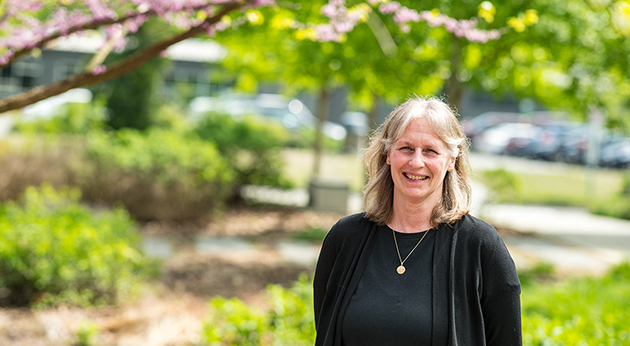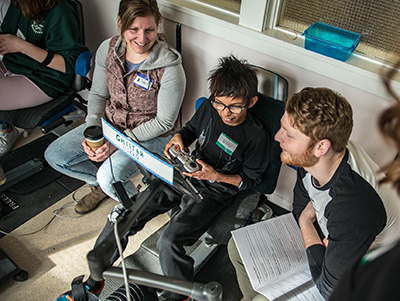Research Excellence: Community-based FASD work earns Research Excellence award for Kathy Keiver

When Dr. Kathy Keiver left the University of British Columbia to join the Kinesiology department at the University of the Fraser Valley, she left the confines of the laboratory to discover a new world of community-focused research.
She went from investigating the effect of prenatal alcohol exposure on rats to researching activity-based intervention programs on children with Fetal Alcohol Spectrum Disorder (FASD).
Now, more than 10 years after joining UFV and switching her research focus, Keiver is being recognized with the UFV Research Excellence award for 2018.
UFV’s Kinesiology department has been involved in research on the impact of exercise on the brains of children with cognitive disabilities for over a decade.
Previous incarnations of this applied research, called FAST club, had the schoolchildren taking part in fun, exercise-based games in a gym setting. UFV researchers would measure whether physical activity resulted in significant cognitive improvement.
Now Keiver, along with Alison Pritchard Orr, her research partner and colleague, have teamed up with Queen’s University researchers in the Exergames project, with a goal of measuring whether having children play video games powered by exercise bikes enhances cognitive function.
UFV students conducted pre-testing on their young research participants and a control group at Chilliwack’s Central Community School before the games portion of the program began, and they did post-testing to measure any changes in May.
“We’re particularly interested in seeing whether exercise and activity enhances the executive function of the brain, activities such as planning and problem-solving, and other higher-order skills,” notes Keiver.
Keiver has been working on the effects of prenatal alcohol exposure since 1993. When she started at UFV in 2006, she began collaborating with kinesiology colleagues to develop and evaluate intervention programs for children with FASD.

“This collaboration allowed me to extend my research interests into new and exciting areas, and to be part of a program that would not have been possible for any of us to have developed alone,” she notes.
It also holds out hope of real life improvement for people with FASD.
“Neuropsychological deficits, resulting from damage to the developing brain, are the most devastating effects of prenatal alcohol exposure for individuals with FASD,” Keiver says. “Intervention programs have the potential to improve these deficits and thus reduce the burden on affected individuals, families and society. One intervention strategy that appears promising for improving multiple areas of the lives of individuals with FASD is exercise or physical activity.”
So far, the UFV research team’s results have shown some improvement in aspects of cognition through activity-based intervention.
They have published their results in peer-reviewed academic journals and presented at conferences.
Another benefit is the research opportunities for UFV students.
“Our research supports undergraduate education at UFV by providing students with opportunities for experiential learning,” Keiver says. “We have employed over 150 UFV students as research assistants and work-study employees over the last 7 years, providing them with opportunities to work with children with disabilities, help organize and administer physical activity programs, perform fitness and neuropsychological testing, analyze data, and disseminate research findings.”
Several of their student researchers have won UFV undergraduate research awards, and many have gone on to graduate studies or professional school in related disciplines.
The UFV research team has received funding from a variety of sources over the years, including Kids Brain Health Network (formerly NeuroDevNet), the BC Ministry of Education, the UFV Faculty of Health Sciences, and the Chilliwack School District.
“It’s very rewarding to be involved in research where you can see the benefits for the participants and work with talented UFV students,” Keiver notes. “I am honoured and thrilled to be recognized for the contributions I have made.”




